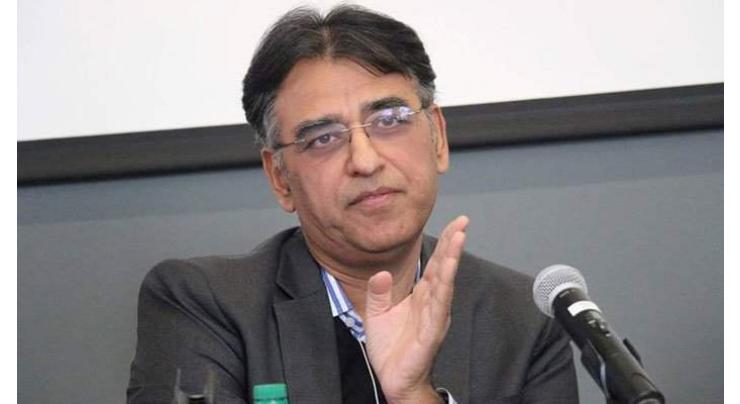
- Home
- Business
- News
- Tax exemptions were introduced to attract new investment in Specialized Economic Zones (SEZs) under ..
Tax Exemptions Were Introduced To Attract New Investment In Specialized Economic Zones (SEZs) Under The China Pakistan Economic Corridor (CPEC) And Other Industrial Units: Finance Minister Asad Umer
Fakhir Rizvi Published January 24, 2019 | 12:12 AM

The minister said tax exemptions were introduced to attract new investment in Specialized Economic Zones (SEZs) under the China Pakistan Economic Corridor (CPEC) and other industrial units
In the Greenfield projects, exemptions were given in sales tax and customs duty for import of plants and machinery, he said and also announced relief in sales and income tax and customs duty on manufacturing of equipment used for renewable energy, including solar panels and wind turbines, for the next five years.
Asad Umar said franchise based sports would be encouraged with tax relief to promote healthy activities among the youth.
He said from July 1, super tax of 4 percent on the non-banking companies would be abolished, corporate tax would continue to be reduced by one percent every year and to boost savings and re-investments, tax on savings and re-investments of companies would end from July 1.
The group formation of industries in the private sector would be encouraged with relief on taxes on dividend earnings, Asad added.
He recalled that the downfall of stock exchange index had started in May 2017 and in seven months it had dropped from 53,000 to 38,000 points, while during the five months of Pakistan Tehreek-e-Insaf government, it had fallen by 5,000 points. During the last three weeks, the stock index again rose by 3,000 points, he added.
The minister said withholding tax of 0.02 percent on stock shares was proposed to be abolished and the stock traders could carry forward the capital losses to offset their deficit.
The only increase in tax rate, he said, would be on 1800 CC imported vehicles while three taxes on cheaper phones would be merged into one and there would be no reduction in tax on expensive phones.
He said tax refunds of Rs 200 billion were not paid to the exporters by the previous regime, but now the incumbent government would issue promissory notes by mid February so that businessmen could take credit from banks which would ensure liquidity for their businesses.
Additional export facilitation measures and duty drawbacks would be informed the Adviser for Commerce, he said, adding administrative cost on palm oil would be ended to cut down prices.
He said the government would introduce legislation to resolve court matters between itself and the business sector to facilitate industry while measures were introduced in the finance bill that would reduce the price of fertilizer by Rs 200 per bag.
The productive index unit for farmers would be raised from 4000 to 6000 units and regulatory duty for diesel engines would be cut down from 17 percent to five percent while in line with the order of Supreme Court duties would be reduced to improve health facilities, the minister said.
He said support from the International Monetary Institution (IMF) would be availed to save the people from the financial burden. The country's economic future was bright as it was not in the hands of those who had bought properties in London, Switzerland and Dubai, he added.
Related Topics
Recent Stories

Seven labourers from Punjab shot dead in Gwadar

Nation will never forget criminals of 9th May who attacked state for politics: P ..

Currency Rate In Pakistan - Dollar, Euro, Pound, Riyal Rates On 9 May 2024

Today Gold Rate in Pakistan 09 May 2024

IHC adjourns PTI founder, Qureshi's appeal till Thursday

CDWP recommends 3 projects to ECNEC for approval

Tarar assures APNS to resolve issues of newspaper industry

Pakistan urged to capitalize on economic stability, for Tobacco Tax Reforms

N. Macedonia polls set to upend ties with EU neighbours

Croatia's ruling party reaches coalition deal with right wing

Bayern coach Tuchel makes three changes for Madrid showdown

Olympic flame arrives on French soil for Paris Games
More Stories From Business
-
Exchange rates for currency notes
2 hours ago -
Foreign exchange rates
2 hours ago -

Currency Rate In Pakistan - Dollar, Euro, Pound, Riyal Rates On 9 May 2024
3 hours ago -

Today Gold Rate in Pakistan 09 May 2024
4 hours ago -

CDWP recommends 3 projects to ECNEC for approval
12 hours ago -

Pakistan urged to capitalize on economic stability, for Tobacco Tax Reforms
12 hours ago
-

Punjab Finance Minister announces expansion of Social Protection Authority's mandate
12 hours ago -

Delegation of dairy industry called on Finance Minister
13 hours ago -

Uzbek FM to deliberate matters of bilateral interest, trade augmentation
13 hours ago -

Pakistani fishing industry attracts Chinese investors: PCJCCI
14 hours ago -

LCCI, PVTC to make joint efforts to bridge skill gap in industrial sector
14 hours ago -

French ambassador meets Finance minister
14 hours ago















